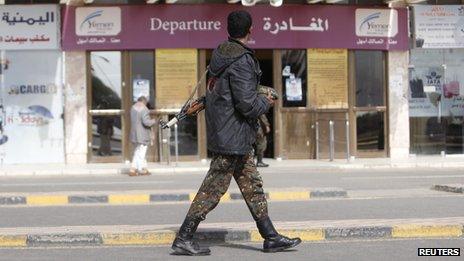Yemen bomb-makers 'working on new devices'
- Published

Bomb-makers in Yemen are determined to develop ever harder-to-detect devices to smuggle on board planes bound for Western countries, according to Whitehall officials.
The number of British airports with security body scanners is now being doubled, from 10 to 21, in response.
Three years ago, a bomb sent from al-Qaeda in Yemen was found on a plane at East Midlands airport, disguised inside a printer. Another reached Dubai airport.
Since then, a further device was discovered in Yemen in May 2012. So just how serious is the threat?
In the airline security business, they call them Artfully Concealed Devices: sophisticated bombs, mostly non-metallic with a hard-to-detect, "low-vapour explosive" like pentaerythritol tetranitrate (PETN), disguised inside ordinary, harmless items like shoes, underpants, soft drink bottles or even printer ink toner cartridges.
Three times al-Qaeda's franchise in Yemen, known as al-Qaeda in the Arabian Peninsula (AQAP), was able to evade airport security and smuggle bombs on board planes in 2009 and 2010.
Now Whitehall officials believe they are trying again. Little wonder that of all al-Qaeda's branches around the world, AQAP in Yemen is considered to be the most dangerous to the West.
"The most serious terrorist threat to European aviation comes from AQAP," said a senior counter-terrorism official who asked not to be named.
"They are technically adept, they move very fast, they have a core of experienced people, they operate in a country with fragile areas and elude the Yemeni authorities. Plus they have the ability to inspire people to lone acts of terror."
What makes AQAP so dangerous is its Saudi master bomb-maker, Ibrahim al-Asiri, one of the CIA's most wanted targets. He is thought to be the brains behind all three non-metallic devices that got past airport security.
Knowing that he is the subject of an intensive US intelligence manhunt and liable to be targeted by a CIA drone any day, he is believed to have spent time training up other militants and passing on his lethal skills.
AQAP have made no secret that they intend to keep trying.
Last year, just weeks before the London Olympics, they handed a new, upgraded device to one of their number who volunteered to be a suicide bomber. But he turned out to be an informant who fled to Saudi Arabia, taking the device with him, which was then passed by the Saudis to the FBI for analysis.
In the UK, the Metropolitan Police's counter-terrorism command has put a replica of the East Midlands airport device on display in a glass case, inside New Scotland Yard.
"As you can see, this is a very sophisticated device," says Commander Richard Walton. "It looks very much like a normal printer, but the technology, the design and the engineering around this device is quite advanced. It took several attempts to find the bomb inside."
The bombs al-Qaeda in Yemen are devising are non-metallic, well-concealed and emit only the faintest of vapours, making them difficult to detect. Each device contains enough explosive to blow a hole in a fuselage.
Two-front fight
According to a terrorism expert at King's College London, Dr Peter Neuman, Western governments are confronting this threat on two fronts.
"The first is the intelligence front, recruiting informers within the organisation, so that you get information about attacks before they happen and when they are being planned," he says.
"The other front is the technological front; I know of a number of projects that are ongoing whereby they are trying to develop ever more sophisticated detectors that allow you to detect the scent of explosives in incredibly small particles."
In a laboratory in Watford, just outside London, one of the most widely used scanners is on display - the IonScan 500, an explosive trace detector.
"Particle detection means if somebody builds a bomb, they leave contamination and that contamination can be minute - transmitted and transferred between people, left on luggage, left on devices," said Kevin Reardon, a security expert at Smiths Detection, the firm that developed the IonScan 500.
A lot of airports outside the EU do not have body scanners such as those being deployed in the UK, or the operators are not always paying attention.
So there is a ban on direct flights from Yemen to the UK, and an EU ban on cargo originating there.
Since last year, there has also been a no-fly policy to stop suspected terrorists even getting on planes, with up to three suspects a year being prevented from flying into the UK.
But al-Qaeda in Yemen have patience and expertise. As Commander Walton says, they will keep trying.